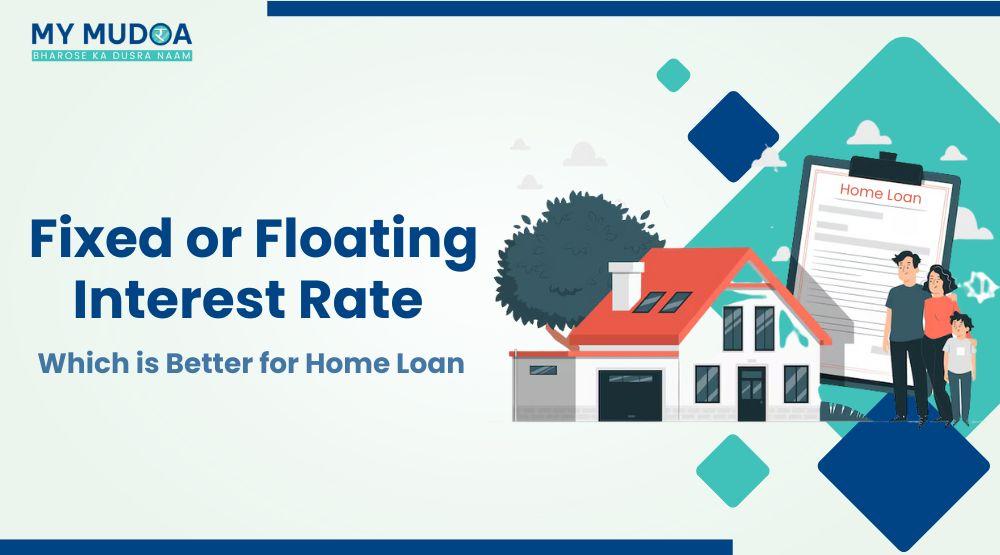
"When taking a home loan, you must decide between a fixed or floating interest rate. A fixed rate offers stability with consistent EMIs, while a floating rate fluctuates based on market conditions, potentially leading to savings when rates drop. Understanding their pros and cons can help you choose the best option for your financial situation."

Published: 29 March 2025
Updated: 1 April 2025
Whether you are looking to buy a new home or construct your dream palace, a home loan can help you with the large sum of money required. But, just like any other loan, there are a lot of factors and decisions involved in applying for a home loan. One of the key factors is the type of interest rate you should opt for. When choosing home loans, most banks offer fixed and floating interest rates for your loan. Both of them have key features and benefits that can help you make a smart financial decision.
In this article, we'll dive deeper into what fixed and floating interest rates are, along with their key differences, to help you choose the one that fits your needs perfectly.
A fixed home loan interest rate means the amount of interest that you have to pay every month is fixed for the whole duration of your loan. This rate is fixed at the time of applying for the loan and continues to be the same throughout.
A floating home loan interest rate, unlike a fixed rate, fluctuates based on the market conditions and the lender’s benchmark rate, such as the repo rate of that time. This means that your EMI can go up or down every other month.
Lower Initial Rate: Floating interest rates are usually lower at the time of the loan application.
Market-Linked Rates: Based on RBI policies, inflation rates, and other economic conditions, your interest rate will keep changing.
Variable EMIs: Your monthly payments can go up and down, helping you save money at times.
The following are the key differences between fixed and floating interest rates:
Factor |
Fixed Home Loan Interest Rate |
Floating Home Loan Interest Rate |
||
|
Pros |
Cons |
Pros |
Cons |
|
|
Interest Rate Stability |
Provides stability and predictability |
Higher than floating rates |
Usually lower than fixed rates initially |
Unstable and fluctuates with market changes |
|
EMI Predictability |
EMI remains constant, making budgeting easier |
No benefit if market rates decrease |
EMI reduces if interest rates fall |
EMI increases if interest rates rise |
|
Market Impact |
Not affected by RBI policy changes |
No advantage when interest rates drop |
Can take advantage of falling interest rates |
Higher risk due to rate fluctuations |
|
Cost Over Time |
Protects against future rate hikes |
May end up paying more if floating rates decrease |
Potential to save money if rates decrease |
Can become costly if rates rise |
|
Prepayment Charges |
Higher penalties for early repayment |
Higher penalties for early repayment |
Lower or no prepayment penalties |
Lower or no prepayment penalties |
|
Loan Tenure Suitability |
Ideal for long-term loans (10-20 years) |
Less beneficial for short-term loans |
More beneficial for short to medium-term loans (5-15 years) |
Uncertainty in the long run |
The following are the key factors that influence the rate of interest on home loans. Understanding these factors will help you make a wiser financial decision as per your needs:
RBI uses several monetary policies to influence the interest rates for loans directly:
Higher inflation rates lead to tighter RBI policies, making borrowing costs higher and increasing home interest rates. Understanding the market forces can help you choose between fixed and floating interest rates. A floating rate is better for capitalising on the lower inflation days.
Your interest rates are determined based on the repayment period of your loan. This implies that by choosing a longer-term loan, like 20-30 years, you are more likely to secure lower interest rates compared to a brief 5-year loan. However, it is worth considering that the rate depends on the lender's policy and risk assessment.
Also read: Home Loan for Pensioners
People with excellent credit scores have various loan options available to them. From better interest rates to flexible loan tenures, a better credit score helps you choose a financial option that fits your needs. A credit score of 700 or above is usually an excellent score. Whether fixed or floating home loan interest rate, your credit score can affect your home loan interest rate.
If you have a stable and high-paying job or are a government official, interest rates are usually on the lower side due to reduced risk for the lender. For self-employed and irregular income applicants, rates can be a bit higher, along with some stringent terms and conditions.
Selecting a fixed home loan interest rate or a floating home loan interest rate is among the key decisions in choosing a home loan. In addition to this important aspect, you should also take into account customer support, loan duration, and the application procedure to guarantee a smooth home loan experience. MyMudra is your trusted partner when it comes to easy access to loan facilities, be it personal, home or a business loan. Our attractive interest rates and smooth application process will help you finance your dream home in just a few clicks. So, what are you waiting for? Apply for a home loan with MyMudra and build your dream home today!
💬 Comments
Leave a comment or ask a question!
Please Enter Your Name
Please Enter Your Email
Please Enter Your Phone
Please Write Your Comment